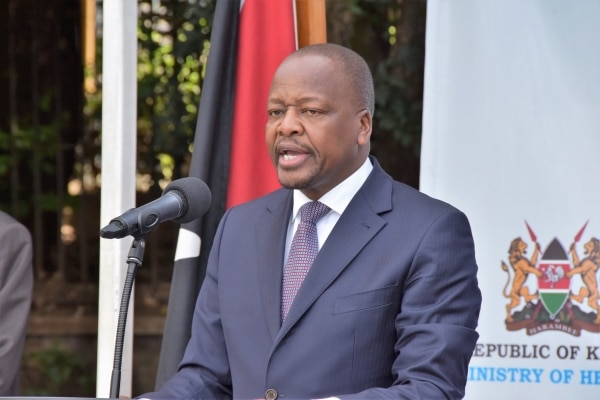Health CS Mutahi Kagwe
- CS Kagwe noted that well thought out social protection programmes will act as safeguards for the economically vulnerable during as an unprecedented third wave of the Covid 19 pandemic continues to ravage economies across the region.
- The seminar, which features delegates from across the continent, including Central Bank Governors, Finance and Economic Affairs Ministers among other stakeholders, is this year being hosted under the theme: “The Global COVID-19 Health Pandemic and Its Implications for the African Economies” underscored the urgent need for social protection for a largely vulnerable population.
- With new infections on the rise, it is a race against time for governments to re-look at some policy interventions necessary to provide appropriate coping and recovery mechanisms to respond to the crisis and provide adequate social protection.
Kenya’s Cabinet Secretary for Health Senator Mutahi Kagwe has underscored the role of social protection programmes’ to ease economic challenges associated with the Covid 19 pandemic.
Speaking when he delivered the Guest of Honour speech at the twenty-third African Economic Research Consortium (AERC) Virtual Senior Policy Seminar, Kagwe noted that well thought out social protection programmes will act as safeguards for the economically vulnerable.
Social protection initiatives, he said, support positive health outcomes by mitigating economic shocks, such as income losses resulting from the measures governments have imposed to contain the spread of COVID-19.
The seminar, which features delegates from across the continent, including Central Bank Governors, Finance and Economic Affairs Ministers among other stakeholders, is this year being hosted under the theme: “The Global COVID-19 Health Pandemic and Its Implications for the African Economies”.
In his address, Kagwe noted that, with new infections on the rise, it is a race against time for governments to re-look at some policy interventions necessary to provide appropriate coping and recovery mechanisms to respond to the crisis.
“Social protection is an effective way to protect immediate human needs and to cushion economic reversals by protecting productive assets,” he said. He added that “If governments have channels in place that they can use to put income into people’s hands when they lose their livelihoods, they can forestall losses that might set economic recovery back years.”
Learning from the Kenyan example, Kagwe advised Economic Policy stakeholders to consider adopting social protection measures such as the Kazi Mtaani initiative. “The objective is to avoid panic sales of productive assets, ensure households keep a roof over their heads, help small businesses to pay wages of furloughed staff, and to provide public works employment while the informal sector is paralyzed,” he said.
Other speakers at the seminar included AERC Executive Director Professor Njuguna Ndung’u, and Dr Arqebe Oqubay, Senior Minister and Advisor to the Prime Minister of Ethiopia, who delivered the keynote speech.
At the seminar, Equity Bank (Kenya) Board Chairman Amb. Erastus Mwencha, who is also the former Vice-Chair of the African Union, served as the Chair of a Special Session honouring the first AERC Executive Director and former Governor of the Tanzania Central Bank, Prof. Bennu Ndulu, who passed on last month (February).
The current Covid-19 pandemic is damaging business ecosystems, affecting livelihoods, and threatening to overturn sub-Saharan Africa’s development progress and growth projections.
The pandemic has brought to the fore economic challenges and exposed many institutions’ frailty across the continent. Yet, as the virus was late in arriving on the continent, we saw governments across Africa taking decisive actions to keep citizens safe and implementing global best practices and policies. While there are apparent capacity and execution shortfalls, there have also been several prosperous areas of practice.
Established in 1988, African Economic Research Consortium (www.aercafrica.org) is a premier capacity building institution in the advancement of research and training to inform economic policies in sub-Saharan Africa. AERC’s mission rests on two premises: first, that development is more likely to occur where there is sustained sound management of the economy; second, that such management is more likely to happen where there is an active, well-informed cohort of locally-based professional economists to conduct policy-relevant research. AERC builds that cohort through a programme that has three primary components: research, training, and policy outreach. The organization integrates high quality economic policy research, postgraduate training, and policy outreach within a vast network of researchers, universities, and policy makers across Africa and beyond.

